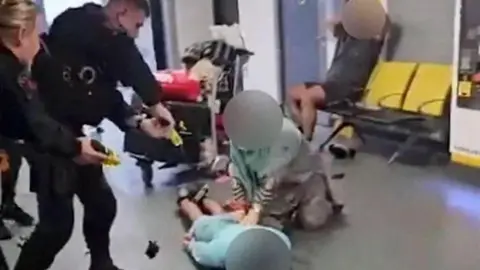In a recent situation drawing significant public attention, a police officer has come under investigation for allegedly disseminating CCTV footage depicting a violent altercation that occurred between law enforcement and two individuals at Manchester Airport. This incident, which took place in July 2024, has raised serious ethical questions regarding the conduct of police officials and the integrity of police operations.
The footage in question became widely circulated on social media platforms, showcasing the confrontation that ensued at the airport. Notably, Mohammed Fahir Amaaz was convicted last week at Liverpool Crown Court for his involvement in attacking two female police officers during this chaos. Consequently, the Independent Office for Police Conduct (IOPC) has confirmed that the officer from Greater Manchester Police is being investigated for potentially sharing sensitive material that relates to an active investigation inappropriately.
During the ongoing investigation, the IOPC plans to collect the officer’s testimony to better understand the circumstances surrounding the incident. They are focused on discerning whether there was any legitimate purpose for sharing the footage related to an open police investigation. This scrutiny follows a referral made to the IOPC in September 2024, prompted by rising concerns regarding the origins and dissemination of this footage to media outlets.
A spokesperson for the IOPC indicated that the ongoing inquiry was initiated due to perceived misconduct regarding the potential misuse of police powers and improper handling of personal data. In addition to investigating the implicated officer, authorities have indicated they are also examining possible violations of the Computer Misuse Act 1990 alongside potential charges related to misconduct in public office and perverting the course of justice.
The brawl itself has not only highlighted issues surrounding police behavior but also showcased the turbulent nature of public interactions with law enforcement. Following a rigorous three-week trial, Amaaz was found guilty of physically assaulting police officers, specifically PC Lydia Ward and PC Ellie Cook, resulting in significant bodily harm. However, despite the verdicts on certain charges, the jury was unable to reach a consensus regarding allegations against Amaaz and his brother, Muhammad Amaad, concerning additional attacks on another officer, PC Zachary Marsden.
This ambiguity in the jury’s decision raises further questions about police conduct and public safety. A retrial for these unanswered allegations has been scheduled for April 2026, emphasizing the extended ramifications of this case.
When examined holistically, this scenario evokes critical discussions about the ethical responsibilities of police officers in maintaining confidentiality and integrity within their functions. The case underlines not only the potential for misuse of official data but also the importance of the public’s trust in law enforcement agencies. The authorities remain keen on ensuring accountability and navigating the complexities involved in modern policing, especially against the backdrop of heightened scrutiny amid concerns surrounding civilian safety and rights.
As investigations by the IOPC progress, further revelations about police practices, public interaction, and the handling of sensitive information may arise, showcasing pivotal learnings for both the police force and the community. Enhanced scrutiny of police protocols and proper training on handling footage related to ongoing investigations may emerge as essential outcomes from this inquiry.
With the significant involvement of social media in disseminating information rapidly, media ethics and transparency concerning law enforcement actions will become increasingly critical in fostering a secure environment where public well-being and civil rights are upheld. Ultimately, as the judicial process unfolds, both the public and police force must engage in a broader dialogue regarding trust, transparency, and accountability.












